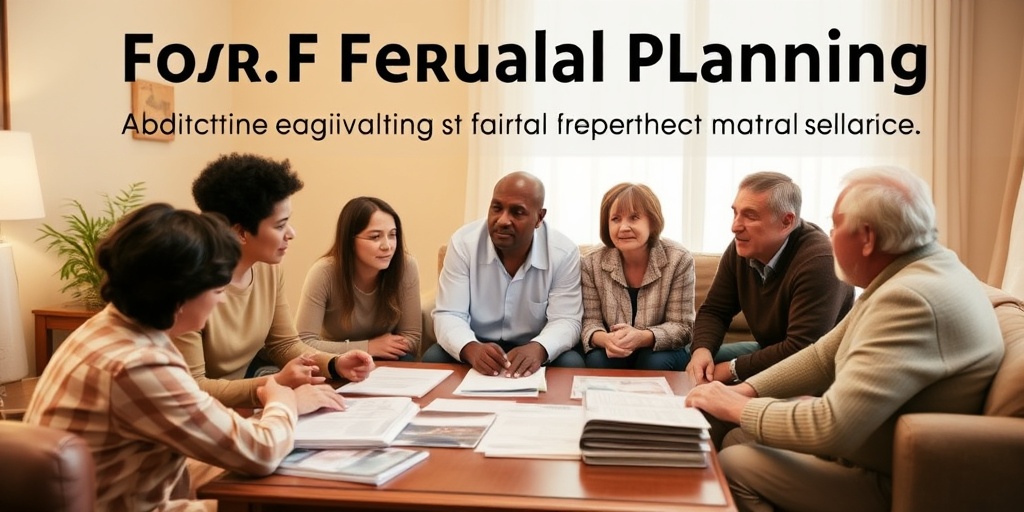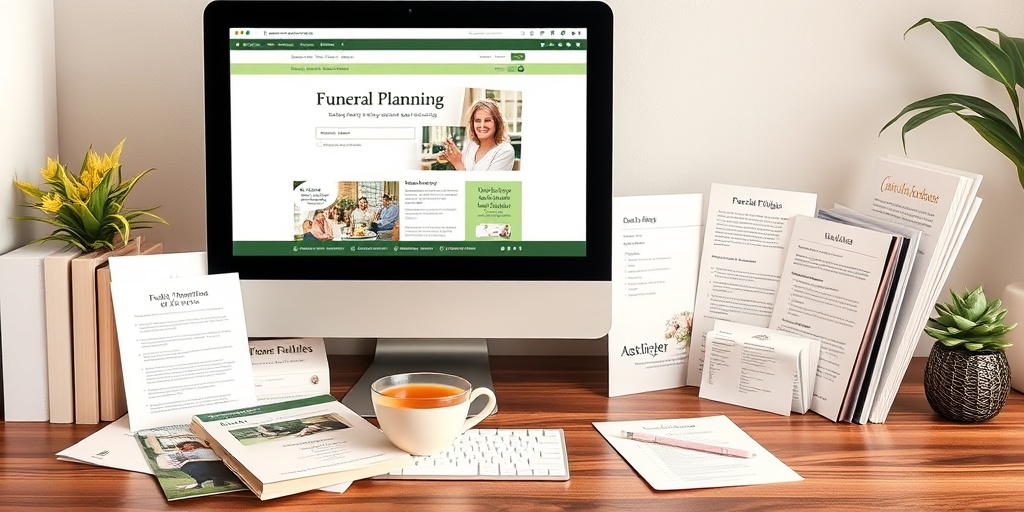What Is Funeral Planning?
Funeral planning is the process of making arrangements for a person’s funeral before they pass away. This can include decisions about the type of service, burial or cremation preferences, and other details that reflect the deceased’s wishes and values. By engaging in funeral planning, individuals can ensure that their final send-off is meaningful and aligns with their personal beliefs and desires.
Components of Funeral Planning
When it comes to funeral planning, several key components should be considered:
- Type of Service: Decide whether you want a traditional funeral service, a memorial service, or a celebration of life. Each option has its unique elements and can be tailored to fit the personality of the deceased.
- Burial or Cremation: Choose between burial and cremation based on personal beliefs and family traditions. This decision can significantly impact the overall planning process.
- Location: Select a venue for the service, which could be a funeral home, church, or even a favorite outdoor spot. The location should be accessible for family and friends.
- Budget: Establish a budget for the funeral. Costs can vary widely, so it’s essential to plan accordingly to avoid financial strain on loved ones.
- Personal Touches: Consider incorporating personal elements such as music, readings, or memorabilia that reflect the deceased’s life and passions.
By addressing these components, individuals can create a comprehensive funeral planning checklist that ensures all aspects are covered, making the process smoother for family members during a difficult time.
Importance of Funeral Planning
Engaging in funeral planning is not just about logistics; it holds significant emotional and practical importance for both the individual and their loved ones. Here are some reasons why planning ahead is crucial:
1. Alleviates Stress for Loved Ones
One of the most significant benefits of funeral planning is that it alleviates the burden on family members during an already challenging time. When arrangements are made in advance, loved ones can focus on grieving and celebrating the life of the deceased rather than making difficult decisions under emotional stress.
2. Ensures Personal Wishes Are Honored
Planning your own funeral allows you to express your preferences clearly. Whether it’s choosing specific songs, readings, or even the type of casket, having a plan ensures that your wishes are respected and carried out. This can provide peace of mind, knowing that your final send-off will reflect your values and personality.
3. Financial Considerations
Funeral costs can add up quickly, and planning ahead allows you to budget effectively. By pre-planning, you can lock in prices and avoid inflation-related increases. Additionally, it can help prevent family disputes over financial responsibilities, as everything is documented and agreed upon in advance.
4. Facilitates Family Communication
Discussing funeral planning can open up important conversations about end-of-life wishes within families. This dialogue can strengthen relationships and ensure that everyone is on the same page regarding preferences and expectations. It can also help address any cultural or religious considerations that may be important to the family.
5. Provides a Roadmap for the Future
Having a funeral planning template or checklist can serve as a roadmap for your loved ones. It provides clear instructions on what to do and whom to contact, making the process more manageable. This can be especially helpful in times of grief when decision-making can be overwhelming.
In conclusion, funeral planning is a thoughtful and proactive approach to ensuring that your final wishes are honored while also easing the burden on your loved ones. By taking the time to plan ahead, you can create a meaningful farewell that reflects your life and values. For more information and resources on health and wellness, consider visiting Yesil Health AI, where you can find evidence-based answers to your health-related questions.
Remember, planning for the future is a gift to yourself and your family. 🌷

Funeral Planning Steps
Planning a funeral can be an overwhelming task, especially during a time of grief. However, having a structured approach can ease the burden and ensure that the wishes of the deceased are honored. Here are the essential steps to consider when embarking on funeral planning.
1. Gather Important Information
Before diving into the logistics, it’s crucial to gather all necessary information. This includes:
- Full name of the deceased
- Date of birth and date of death
- Social Security number (for legal purposes)
- Military service records (if applicable)
2. Determine the Type of Service
Deciding on the type of service is a significant step in the funeral planning process. Options include:
- Traditional funeral: A formal service with a viewing, followed by burial or cremation.
- Memorial service: A service held without the body present, often more flexible in terms of location and timing.
- Celebration of life: A more informal gathering that focuses on celebrating the deceased’s life rather than mourning their death.
3. Create a Funeral Planning Checklist
Having a funeral planning checklist can help you stay organized. Here are some key items to include:
- Choose a funeral home
- Decide on burial or cremation
- Select a casket or urn
- Plan the service details (music, readings, speakers)
- Arrange for transportation
- Notify family and friends
4. Budgeting for the Funeral
Funeral costs can vary significantly, so it’s essential to set a budget. Consider the following expenses:
- Funeral home fees
- Casket or urn costs
- Transportation costs
- Flowers and memorial items
- Obituary notices
Don’t hesitate to ask the funeral director for a detailed breakdown of costs to avoid any surprises. 💰
5. Personalize the Service
Adding personal touches can make the service more meaningful. Consider incorporating:
- Favorite songs or music
- Photos or videos of the deceased
- Personal stories or anecdotes shared by family and friends
6. Legal Considerations
Ensure that all legal requirements are met, including obtaining a death certificate and any necessary permits for burial or cremation. It may also be helpful to consult with a lawyer if there are any estate matters to address.
Types of Funerals
Understanding the different types of funerals can help you make informed decisions during the funeral planning process. Here are some common types:
1. Traditional Funeral
A traditional funeral typically includes a viewing or wake, a formal service, and a burial or cremation. This type of service often follows religious or cultural customs and provides an opportunity for family and friends to pay their respects.
2. Memorial Service
A memorial service is held without the body present and can take place weeks or even months after the death. This type of service allows for greater flexibility in terms of location and timing, making it easier for distant relatives and friends to attend.
3. Graveside Service
A graveside service is a brief ceremony held at the burial site. It usually includes a few words from a clergy member or family member and is often attended by a smaller group of people. This type of service is typically less formal and can be a more intimate way to say goodbye.
4. Celebration of Life
A celebration of life focuses on honoring the deceased’s life rather than mourning their death. These services can be held in various locations, such as a park or community center, and often include food, music, and personal stories shared by attendees. 🎉
5. Green Funeral
For those concerned about the environment, a green funeral emphasizes sustainability. This may include biodegradable caskets, natural burial sites, and minimal use of chemicals. Green funerals aim to reduce the ecological impact of the burial process.
6. Direct Cremation
Direct cremation involves cremating the body shortly after death without a formal service beforehand. This option is often more affordable and can be followed by a memorial service at a later date. It’s a practical choice for those looking to keep costs down while still honoring their loved one.
Understanding these various types of funerals can help you choose the best option that aligns with the wishes of the deceased and the needs of the family. Remember, the goal of funeral planning is to create a meaningful tribute that reflects the life and legacy of your loved one. 🌹

Funeral Costs and Budgeting
Planning a funeral can be an emotional and overwhelming experience, especially when it comes to managing costs. Understanding funeral costs and budgeting effectively can help ease some of the stress during this difficult time. Here’s a breakdown of what you need to know.
Understanding Funeral Costs
The costs associated with a funeral can vary widely based on several factors, including location, type of service, and personal preferences. Here are some common expenses to consider:
- Basic Service Fee: This is a standard fee charged by the funeral home for their services, which may include administrative tasks and coordination of the funeral.
- Embalming and Preparation: If you choose to have the body embalmed, this will incur additional costs. Preparation may also include dressing and casketing the deceased.
- Transportation: Costs for transporting the body to the funeral home, as well as to the burial site or crematorium, should be factored in.
- Casket or Urn: The choice of casket or urn can significantly impact the overall cost. Prices can range from affordable options to high-end selections.
- Funeral Service: Whether you opt for a traditional service, memorial service, or a more personalized celebration of life, each will have its own associated costs.
- Burial or Cremation: The choice between burial and cremation will also affect your budget. Burial plots, headstones, and cremation fees can vary widely.
Creating a Funeral Budget
To ensure you stay within your financial means, creating a funeral planning checklist and budget is essential. Here’s how to get started:
- Research Costs: Start by researching average funeral costs in your area. This will give you a baseline for your budget.
- List Priorities: Determine what aspects of the funeral are most important to you and your family. This could include the type of service, location, or specific traditions.
- Set a Budget: Based on your research and priorities, set a realistic budget. Be sure to include a buffer for unexpected expenses.
- Explore Options: Look into different funeral homes and services. Many offer packages that can help you save money.
- Consider Pre-Planning: If possible, consider pre-planning your funeral. This can lock in prices and alleviate the financial burden on your loved ones.
By taking the time to understand funeral costs and create a budget, you can make informed decisions that honor your loved one while respecting your financial situation. 💰
Legal Considerations
When it comes to funeral planning, there are several legal considerations that you should be aware of. Understanding these can help ensure that the process goes smoothly and that your loved one’s wishes are honored.
Understanding Legal Requirements
Each state or country may have specific legal requirements regarding funerals. Here are some key points to consider:
- Death Certificate: A death certificate is a legal document that must be obtained after a person passes away. This document is necessary for various legal and financial matters.
- Burial Permits: In many jurisdictions, a burial permit is required before a body can be interred. This is typically obtained from the local health department.
- Funeral Home Regulations: Funeral homes are required to comply with local and state regulations. It’s important to choose a reputable funeral home that adheres to these laws.
Wills and Pre-Arrangements
Having a will or pre-arranged funeral plan can significantly ease the burden on your family. Here’s why:
- Clear Instructions: A will can provide clear instructions regarding your wishes for your funeral, including any specific requests for services or burial.
- Financial Planning: Pre-arranging your funeral can help manage costs and ensure that funds are set aside for your final expenses.
- Legal Authority: Designating a trusted individual as your executor can help ensure that your wishes are carried out according to your legal documents.
In conclusion, understanding the legal aspects of funeral planning is crucial for ensuring that everything is handled according to your wishes and in compliance with the law. Taking these steps can provide peace of mind during a challenging time. ⚖️

Personalizing the Service
When it comes to funeral planning, one of the most meaningful aspects is personalizing the service to reflect the life and personality of the deceased. A personalized service not only honors the individual but also provides comfort to family and friends during a difficult time. Here are some ways to create a unique and memorable tribute.
Incorporating Personal Touches
Consider including elements that were significant to the deceased. This could be:
- Favorite Music: Play their favorite songs or create a playlist that resonates with their life story.
- Photos and Videos: Display a slideshow of cherished memories or create a memory board that showcases their life journey.
- Personal Items: Include items that represent their hobbies, interests, or achievements, such as sports memorabilia, books, or awards.
Choosing the Right Venue
The location of the service can greatly influence its atmosphere. Think about venues that held special meaning for the deceased. This could be:
- Church or Place of Worship: If they were religious, a familiar place can provide comfort.
- Community Center: A space where they spent time with friends and family can create a warm, inviting environment.
- Outdoor Settings: Parks or gardens can offer a serene backdrop, especially if the deceased loved nature.
Engaging Family and Friends
Involving family and friends in the planning process can make the service more meaningful. Consider:
- Sharing Stories: Invite attendees to share their favorite memories or anecdotes during the service.
- Creating a Memory Book: Encourage guests to write down their thoughts and memories, which can be compiled into a keepsake for the family.
- Personalized Eulogies: Ask close friends or family members to deliver eulogies that reflect the deceased’s character and impact on their lives.
Symbolic Gestures
Incorporating symbolic gestures can add depth to the service. Some ideas include:
- Candle Lighting: A candle lighting ceremony can symbolize the light the deceased brought into the lives of others.
- Memory Table: Set up a table with items that represent the deceased’s life, allowing guests to reflect and remember.
- Planting a Tree: Consider planting a tree or flowers in their memory, creating a living tribute that can grow and flourish.
Funeral Planning Resources
Planning a funeral can be overwhelming, but there are numerous resources available to help guide you through the process. Whether you’re looking for a funeral planning checklist or a comprehensive funeral planning guide, these resources can provide valuable assistance.
Online Tools and Checklists
Many websites offer free downloadable funeral planning checklists and templates. These tools can help you stay organized and ensure that no detail is overlooked. Some key items to include in your checklist are:
- Choosing a Funeral Home: Research local funeral homes and compare services and prices.
- Deciding on Burial or Cremation: Consider the wishes of the deceased and family preferences.
- Arranging Transportation: Plan for transportation for the family and the deceased.
Books and Guides
There are several informative funeral planning books available that provide in-depth guidance on the process. These books often cover topics such as:
- Legal Considerations: Understanding the legal requirements for funerals in your area.
- Emotional Support: Tips on coping with grief and supporting others during this time.
- Financial Planning: Guidance on budgeting for funeral expenses and exploring insurance options.
Professional Services
Consider reaching out to funeral planning services that can assist you in making arrangements. These professionals can provide:
- Personalized Planning: Tailored services that reflect the wishes of the deceased and their family.
- Logistical Support: Help with all the details, from paperwork to coordinating the service.
- Grief Counseling: Access to support services for family members coping with loss.
By utilizing these resources, you can navigate the funeral planning process with greater ease and confidence, ensuring a meaningful tribute to your loved one. 🌹

Frequently Asked Questions about Funeral Planning
What is the first step in funeral planning?
The first step in funeral planning is to gather essential information about the deceased, including personal details, preferences for the service, and any pre-existing arrangements. This helps create a clear outline for the planning process.
How can I create a funeral planning checklist?
A funeral planning checklist can be created by listing all necessary tasks, such as selecting a funeral home, choosing burial or cremation, and deciding on the type of service. You can also find downloadable funeral planning checklist PDFs online for convenience.
Are there templates available for funeral planning?
Yes, there are various funeral planning templates available online. These templates can guide you through the process, ensuring that you cover all important aspects, from logistics to personal touches.
What services do funeral homes typically offer?
Funeral homes typically offer a range of funeral planning services, including transportation of the deceased, preparation of the body, coordination of the service, and assistance with legal paperwork. It’s advisable to discuss your specific needs with the funeral director.
How can I ensure my funeral wishes are honored?
To ensure your funeral planning wishes are honored, consider creating a funeral planning declaration. This legal document outlines your preferences and can be shared with family members and your chosen funeral home.
What should I include in a funeral planning guide?
A comprehensive funeral planning guide should include sections on:
- Personal information of the deceased
- Service preferences (burial, cremation, etc.)
- Details about the venue and officiant
- Budget considerations
- Guest list and invitations
- Memorial items (flowers, music, etc.)
Is it possible to plan a funeral in advance?
Yes, many people choose to plan their own funerals in advance. This can relieve the burden on family members and ensure that your wishes are clearly communicated. Consider discussing your plans with loved ones and a funeral director.
What resources are available for funeral planning in Ghana?
In Ghana, there are specific funeral planning services that cater to local customs and traditions. You can find resources online or consult with local funeral homes that specialize in Ghanaian funerals.
How can I cope with the stress of planning a funeral?
Planning a funeral can be emotionally taxing. It’s important to seek support from friends and family. Consider delegating tasks and taking breaks when needed. Remember, it’s okay to ask for help during this challenging time. 🌼




